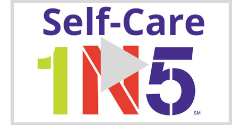
Explore resources for how to maintain self-care through:
Mindfulness was definitely a buzzword in 2018, but what does it really mean? To put it simply, mindfulness is being aware of how you’re feeling physically and emotionally, staying aware of your surroundings, and remaining in the moment rather than thinking about the past or worrying about the future. You’re in touch with yourself and what’s going on around you. Mindfulness allows you to appreciate every moment for what it is without expectations.
Creating balance in your life means establishing a routine (or habits) of self-care. Don’t know where to start? We’ve created a list below and will continue to add more tips and techniques for self-care, mindfulness, meditation, and more so that you can live your best life.
Organizations
Articles
- Calming the Teenage Mind in the Classroom
- CNN
- The Power of Mindfulness
- Child Mind
- Meditation May Boost Teen Memory
- Science News for Students
- All it Takes is 10 Mindful Minutes
- Andy Puddicombe and TED Talks
- 25 Fun Mindfulness Activities for Children and Teens
- Courtney Ackerman – PositivePsychology.com
Classroom Resources
- Mindfulness Flyer
- Chopra Center Meditation
- Go Noodle
- We created these 2-3 minute mindfulness exercises to use in the classroom when students are in need of a short calming exercise:
- YouTube Videos for Kids
Tools
A mindful journaling practice can take many forms, but here are a few ideas to help you get started.
- How To Become More Mindful Using Nothing But A Journal
- Start A Mindful Journal
- A Simple Weekly Mindful Practice: Keep a Gratitude Journal
- The Mindfulness Toolkit
- The Power of Journaling
Gratitude is a powerful tool, with benefits to mental and physical health. Here are some ideas to help begin a gratitude practice.
Mindful Movement and Meditation
Self-love is an essential part of self-care.

Teens should sleep 8 to 10 hours a night according to the American Academy of Pediatrics (AAP). However, according to the AAP (2014), 59% of middle school students, and 87% of high school students are sleeping less than is recommended. Unfortunately, not getting enough sleep each night is associated with an increase in injuries, hypertension, obesity, and depression, especially for teens who may experience an increased risk of self-harm or suicidal thoughts. Fortunately, the AAP found that adequate sleep duration for age on a regular basis leads to improved attention, behavior, learning, memory, emotional regulation, quality of life, and mental and physical health.
Organizations
Articles
- American Academy of Pediatrics – Recommended Hours of Sleep by Age
- Why Do We Need Sleep?
- 3 Bedtime Activities to Encourage a Great Night’s Sleep
- One More Reason to Get a Good Night’s Sleep
- Jeff Iliff is a neuroscientist who explores the unique functions of the brain.
- Sleeping Well in the Digital Age
- Georgetown University – School of Nursing and Health Studies
- Sleep FAQs: Your Most Common Questions Answered
- On Our Sleeves; Nationwide Children’s Hospital
Articles
-
- Health Sleep Tips
- Healthy sleep habits can make a big difference in your quality of life. Check out these sleep tips.
- Health Sleep Tips
-
- 17 Proven Tips to Sleep Better
- Research shows that poor sleep has immediate negative effects on your hormones, exercise performance and brain function. Here are 17 tips to help you sleep better.
- 17 Proven Tips to Sleep Better
-
- Teaching Kids the Importance of Sleep
- Use this website to help explain to kids why we need sleep.
- Teaching Kids the Importance of Sleep
Many of us understand the importance of eating healthy to maintain our physical health. However, according to the Mental Health Foundation, “the evidence indicates that food plays an important contributing role in the development, management, and prevention of specific mental health problems such as depression, schizophrenia, attention deficit hyperactivity disorder, and Alzheimer’s disease”. Improving your diet may help you improve your mood, give you more energy, and help you think more clearly. Checkout the resources below to learn more about eating well.
Organizations
Articles
- Food and Mood
- Explore the relationship between what you eat and how you feel, including tips on how to incorporate healthy eating into your life.
- Does what you eat affect your mood?
- This article explores how food can improve or exacerbate our mood.
- Childhood Nutrition
- Learn more about childhood nutrition from birth through the teenage years.
- 9 Must Eat Nutrients for Children
- Find out what eating a “balanced diet” for a child looks like.
Tools
- How to Eat Healthy
- Eating Right on a Budget
- Get your MyPlate Plan
- The MyPlate Plan shows your food group targets – what and how much to eat within your calorie allowance. Your food plan is personalized, based on your age, sex, height, weight, and physical activity level.
- EatFresh.org Mini Course
- This CDC website is a great resource to evaluate if your child’s BMI is appropriate for their personal factors.
- Nutrition and Fitness information and Tools for Parents
- Nutrition and Fitness Information and Tools for Teens
Many individuals are aware of the importance of physical activity for our physical health, however many are unaware of the link between physical activity and our mental health. According to the Department of Health, Regular physical activity reduces the risk of depression and has positive benefits for mental health including reduced anxiety, and enhanced mood and self-esteem. Additionally, according to Connecticut Children’s Hospital, “Healthy, physically active kids also are more likely to be academically motivated, alert, and successful. And physical competence builds self-esteem at every age.”
Organizations
Articles
- Fitness for Kids that Don’t Like Sports
- Not every child has to join a team, and with enough other activities, kids can be fit without them.
- The Connection Between Physical Health and Mental Health
- We often talk about the mind and body as though they are completely separate – but they aren’t. The mind can’t function unless your body is working properly.
- Why Be Fit? Physical and Mental Health Benefits to Movement
-
- Being fit increases energy, maintains physical functionality, and may prevent or minimize complications from chronic diseases.
Classroom Resources
- Classroom Exercises to Improve Grades and Behavior
- Simple Ideas to Incorporate Movement into the Classroom
- 21 Ways to Get Your Students Moving
Tools
- Easy exercises for Teens
- Finding it hard to fit in fitness? Check out these three strength-building exercises you can do at home.
- Workout Ideas
- 30-minute workouts for any schedule.
- Tips to Unplug and Get Moving
- Check out these tips to reduce screen time and incorporate movement into your family routines.
- 18 Best Health and Fitness Apps of 2018
- Simple Workouts for Teens
- These 10 conditioning moves help build endurance, balance, agility, and coordination while strengthening the whole body.





